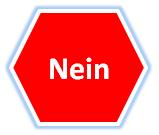Negation and Affirmation (German Language)
No in German. The types of negation: "nein", "nicht", "kein", "nie", "niemand", "nichts"...

Types of Negation: "Nein", "nicht", "kein"
Nein
We use "nein" when we answer negatively to a direct question.
Hast du einen Kuli? Nein
Do you have a pen? No
Nicht
We use "nicht" in several cases:
- When we negate a verb.
Willst du kommen? Nein, ich will nicht gehen
.
Do you want to come? No, I do not want to go
- When we negate an adjective or adverb.
Dieses Auto ist nicht groß
This car is not big
Kein
It can be translated as "none". We recommend that you study the pronoun "kein" in detail because the way it functions is not obvious and it is used very often in German. "Kein" has 2 functions:
- attributive (accompanying a noun)
- not attributive, without an article
"Kein" with an attributive function
When "kein" comes before a noun (attributive function) its function is similar to that of an article:
Hast du einen Kuli? nein, ich habe keinen Kuli
Do you have pen? No, I don’t have a pen.
Declension of "Kein" (attributive)
It is declined as the indefinte article, except in plural forms:
| Masculine | Feminine | Neuter | Plural | |
| Nominative | kein | keine | kein | keine |
| Accusative | keinen | keine | kein | keine |
| Dative | keinem | keiner | keinem | keinen |
| Genitive | keines | keiner | keines | keiner |
"Kein" with no attributive function and without an article
Hast du ein Auto? Nein, ich habe keines
.
Do you have a car? No, I don’t have one.
"Kein" without an attributive function is declined with the strong declension:
| Masculine | Feminine | Neuter | Plural | |
| Nominative | keiner | keine | keines | keine |
| Accusative | keinen | keine | keines | keine |
| Dative | keinem | keiner | keinem | keinen |
| Genitive | keines | keiner | keines | keiner |
Other types of negation
The particles nichts, nie and niemand are also used for negation:
- nichts (nothing)
Ich habe nichts zu verlieren
I have nothing to lose
- nie (never)
Ich war nie dort
I was never there - niemand (no one/nobody)
Niemand war dort
No one/nobody was there
The affirmation "Ja"
"Ja" means "yes" and, just like in English, it is used to answer closed questions:
Hast du Kulis? Ja, ich habe drei
.
Do you have pens? Yes, I have three.
Answering questions with negation: "Doch" and "Nein"
Questions are often asked in German with negation. We could answer negatively to this type of question with "nein" or affirmatively with "doch."
Hast du keinen Kuli? Nein, ich habe keinen Kuli.
Don’t you have a pen? No, I don’t have a pen.
Hast du keinen Kuli? Doch, ich habe drei.
Don’t you have a pen? Yes, I have three.
Audiovisual Supplement
A beautiful Disney song: Farbenspiel des Winds (Pocahontas) with German subtitles
Next Lessons:
home > : Pronouns | Prepositions | Nouns | Plurals | Diminutives | Verbs | Conjugation | Passive | Irregular verbs | Modal Verbs | Separable verbs | Reflexive verbs | Reciprocal verbs | Impersonal verbs | Conjunctions | Articles | Adverbs | Konjunktionaladverbien | Adjective | Comparative and superlative | Word order in German | Interrogation | Indirect question | Subordinates | relative clauses | Conditional clauses | Comma
Suggestions to Help You | Difficulties with learning German | Greetings